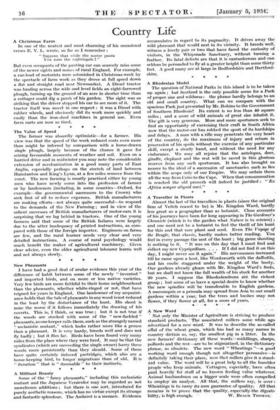The Value of Speed The farmer was absurdly optimistic—for a
farmer. His view was that the speed of the work reduced costs even more than might be inferred by comparison with a horse-drawn single plough, largely because of the chance it gave for seizing favourable moments of weather and soil. Even on a hurried drive and in midwinter you may note the considerable extension of mechanization in a good many parts of East Anglia, especially perhaps on the stretch of land between Hunstanton and King's Lynn, at a few miles remove from the coast. The new farming is mostly practised either by young men who have newly come into the profession of farmer or by landowners (including, in some counties—Oxford, for example—the governmental successors to the Crown) who seek first of all to reduce expenses. British manufacturers are making efforts—not always quite successful—to respond to the demands of the New Farming ; and in view of the salient successes of British manufacturers of motor-cars it is surprising that we lag behind in tractors. One of the young farmers said that some of the British failures were largely due to the utter inadequacy of printed instructions, as com- pared with those of the foreign importer. Engineers on farms are few, and the rural learner needs very clear and very detailed instructions. A course of rural psychology would much benefit the maker of agricultural machinery. .Given clear advice, even the older agricultural labourer learns well and not always slowly.






































 Previous page
Previous page